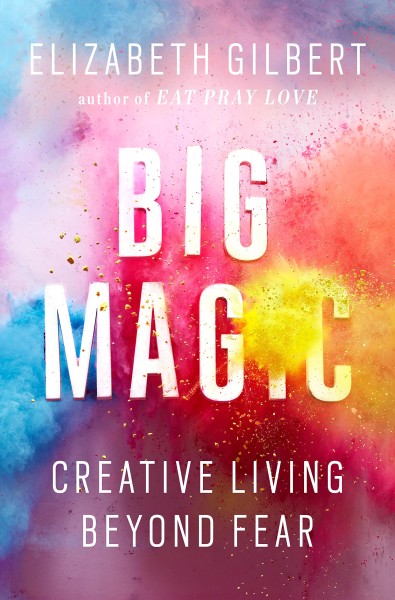I finished reading my fiftieth book of the year last night and it was a good one. In the most fitting and providential way, Big Magic came around at the same time as NaNoWriMo and it has served as my everyday source of nugget-sized encouragement to keep writing throughout the month. (I’m at 37,000+ words right now.)
 Elizabeth Gilbert had this book on her brain for years, but it wasn’t until she finished The Signature of All Things that she felt ready and able to speak on behalf of creativity.
Elizabeth Gilbert had this book on her brain for years, but it wasn’t until she finished The Signature of All Things that she felt ready and able to speak on behalf of creativity.
Normally, her work is heavily researched and quantified, but Big Magic is basically a personal letter to me (and other creatives) that reads something like, “Here’s what I know about creativity and fear after twenty-some years of writing and forty-some years living.”
Of course I loved every bit of it.
Though the books isn’t exclusively for writers, it’s definitely geared towards the right-brained mind. Artists, musicians, makers of anything, people who have untapped energy to DO SOMETHING but are afraid of failure. This designation – people who make stuff – casts a wide net though, because generations of people have been making things since the beginning of time. Creativity is why we still exist. People had ideas and then they had the courage to go public.
Part of the book gets personal with a collection of Liz’s own experience in publishing, prioritizing, and following curiosities down unforeseen roads to see where they lead. (They led to book ideas, by the way.) But there are also other accounts of exploring creativity, quotes by Picasso and John Lennon, anecdotes of roads other people traveled to reach their own level of personal success.
I’ll spare you the entire road map. Instead, I’ll share with you a few of my favorite parts and leave it there.
“I’ve watched far too many brilliant and gifted female creators say, “I am 99.8 percent qualified for this task, but until I master that last smidgen of quality, I will hold myself back, just to be on the safe side.” Now I cannot imagine where women ever got the idea that they must be perfect in order to be loved or successful. (Ha ha ha! Just kidding! I can totally imagine: We got it from every single message society has ever sent us! Thanks, all of human history!) But we women must break this habit in ourselves — and we are the only ones who can break it. We must understand that the drive for perfectionism is a corrosive waste of time, because nothing is ever beyond criticism. No matter how many hours you spend attempting to render something flawless, someone will always be able to find fault with it…. At some point, you really just have to finish your work and release it.”
“Maybe I won’t always be successful at my creativity, but the world won’t end because of that. Maybe I won’t always be able to make a living out of my writing, but that’s not the end of the world either, because there are lots of other ways to make a living besides writing books — and many of them are easier than writing books… So let’s try to wrap our minds around this reality: There’s probably never going to be any such thing in your life or mine as ‘an arts emergency.’ That being the case, why not make art?”
“The fun part is when you’re actually creating something wonderful, and everything’s going great, and everyone loves it, and you’re flying high. But such instances are rare. You don’t just get to leap from bright moment to bright moment. How you manage yourself between those bright moments, when things aren’t going so great, is a measure of how devoted you are to your vocation, and how equipped you are for the weird demands of creative living.”
And finally,
“Fierce trust asks you to stand strong with this truth: ‘You are worthy, dear one, regardless of the outcome. You will keep making your work, regardless of the outcome. You will keep sharing your work, regardless of the outcome. You were born to create, regardless of the outcome. You will never lose trust in the creative process, even when you don’t understand the outcome.’
There is a famous question that shows up, it seems, in every single self-help book ever written: ‘What would you do if you knew you could not fail?’ But I’ve always seen it differently. I think the fiercest question of all is this one: ‘What would you do even if you knew that you might very well fail? What do you love doing so much that the words failure and success essentially become irrelevant?‘”
So there you go. Buy Big Magic here.
